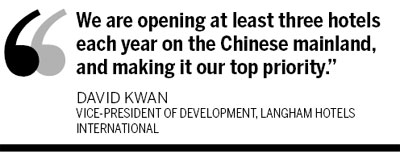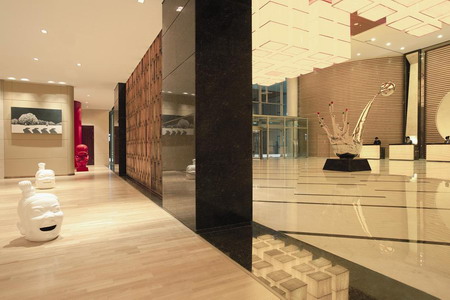Business
Hoteliers look to middle-range market for Chinese expansion
By Wang Zhuoqiong (China Daily)
Updated: 2010-12-02 07:56
 |
Large Medium Small |
|
|
BEIJING - Encouraged by the increasing number of domestic and inbound travelers, the Hong Kong-based hotel chain, Langham Hotels International (LHI), will accelerate its expansion in China's high-end and mid-scale markets by adding more than 50 hotels on the mainland during the next decade.
"We are opening at least three hotels each year on the Chinese mainland, and making it our top priority," said David Kwan, vice-president of development in China at LHI, which owns two upscale brands, The Langham and The Langham Place, and the affiliated mid-range Eaton brand.
LHI itself is part of the Great Eagle Group, a Hong Kong-listed property company.
The company has recently opened three hotels in Shanghai and one in Beijing, and has another six set to open in other cities including Ningbo, Dalian and Guangzhou. Of the 50 hotels in the pipeline, LHI has invested in 10 and provided management for the other 40.
With three hotel brands targeting customers at the mid-scale, upper-mid-scale and extended-stay markets, the Eaton Hotel Group plans to open more than 100 hotels in China to expand its network in second- and third-tier cities.
However, the focus is firmly on the mid-scale market because in China it has greater volume than the luxury market, said John Dick, vice-president and managing director of Eaton Smart, Hong Kong.
Opened in April, the Shanghai Nanqiao Eaton Hotel has achieved a 60 percent occupancy rate so far, and that figure stayed steady, despite predictions that it would fall in the weeks after the recent 2010 Expo Shanghai.
According to Dick, Eaton Smart's Hong Kong location gives it an edge over foreign competitors as it is better connected with colleagues and customers on the Chinese mainland. "We are very well-located and understand the market, which gives us an edge and helps us to work closely with developers and owners," he said in Beijing on Wednesday.
Steady development is essential to hoteliers because of concerns that a knee-jerk reaction to competition and hasty plans might lead to operational failures further down the line.
"The large number of new hotels does not necessarily translate into responsibility and profitability for the building's owners and developers, and can sometimes cause a conflict of interests," said Kwan of LHI.
Despite the rapid construction of five-star hotels in Sanya city on Hainan island, LHI chose to wait before committing resources and entering that particular market.
"We are looking for an exclusive place where it has its own beach and can be a sustainable, high-value destination for travelers," said Kwan, who is in talks with a local developer. The hotel chain is also in discussions with resort projects in scenic places such as Huangshan Mountain in Anhui province, and Huangguoshu Waterfall in Guizhou province in Southwest China.
The local mid-scale players do not worry Kwan. "With their experience and traditions, foreign brands have stood out mostly in terms of details," he said. "It is about how you revamp the hotel, how you put up the lights, and every other little thing."
Adopting the can-do spirit as their trump card, LHI hopes to provide services that engage customers. "We've discovered that frequent travelers are self-sufficient and want to be engaged on a human level," said Dick. "Chinese consumers want to be recognized, feel important and welcomed when they arrive at a hotel."
China Daily

